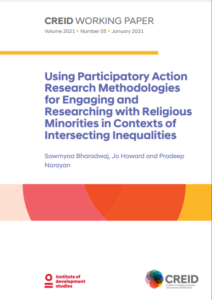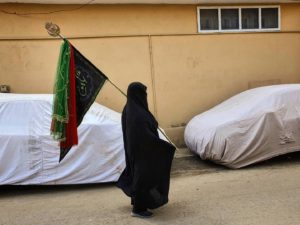 While there is growing scholarship on the intersectional nature of people’s experience of marginalisation, analyses tend to ignore religion-based inequalities. A lack of Freedom of Religion and Belief (FoRB) undermines people’s possibilities of accessing services and rights and enjoying wellbeing (World Bank 2013; Narayan et al. 2000, Deneulin and Shahani 2009).
While there is growing scholarship on the intersectional nature of people’s experience of marginalisation, analyses tend to ignore religion-based inequalities. A lack of Freedom of Religion and Belief (FoRB) undermines people’s possibilities of accessing services and rights and enjoying wellbeing (World Bank 2013; Narayan et al. 2000, Deneulin and Shahani 2009).
In this paper, we discuss how religion and faith-based inequalities intersect with other horizontal and vertical inequalities, to create further exclusions within as well as between groups. We offer our experience of using participatory action research (PAR) methodologies to enable insights into lived experiences of intersecting inequalities. In particular, we reflect on intersecting inequalities in the context of India, and share some experiences of facilitating PAR processes with marginalised groups, such as Denotified Tribes (DNT). We introduce a FoRB lens to understand how DNT communities in India experience marginalisation and oppression.
See also…
Online hatred pushing minorities to the periphery: An analysis of Pakistani social media feeds (publication)
I Don’t Forward Hate (project)
Bharadwaj, S.; Howard, J. and Narayanan, P. (2020) Using Participatory Action Research Methodologies for Engaging and Researching with Religious Minorities in Contexts of Intersecting Inequalities, CREID Working Paper 5, Coalition for Religious Equality and Inclusive Development, Brighton: Institute of Development Studies

